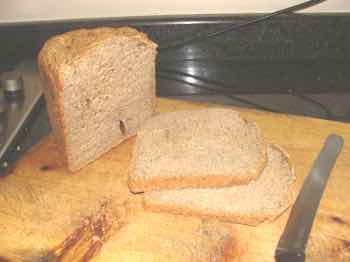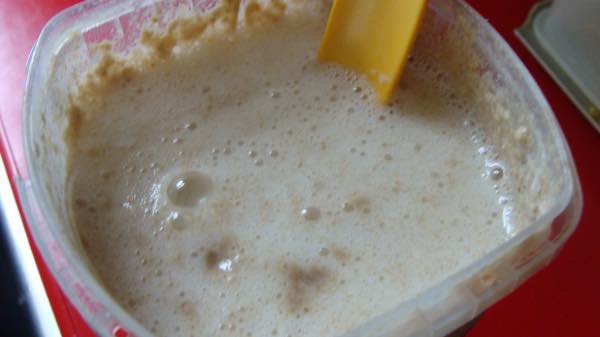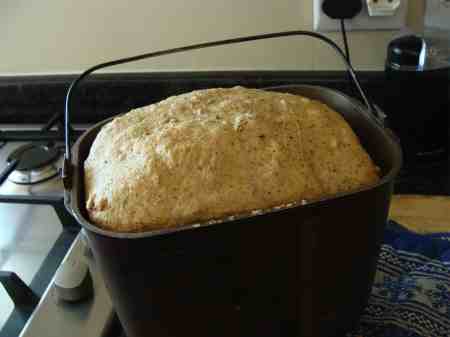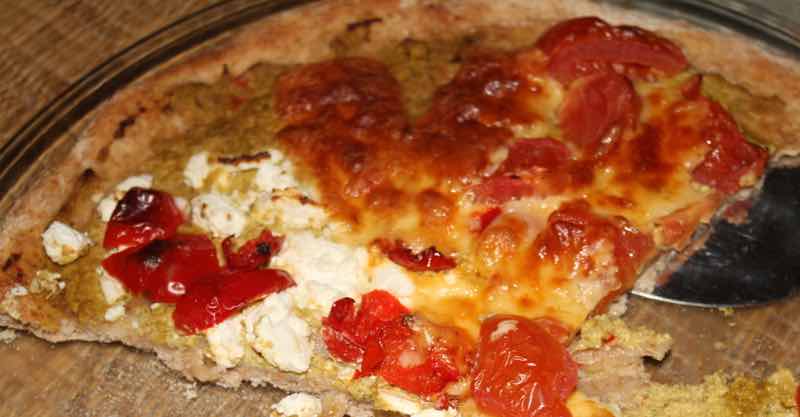- Bernard Preston homepage
- Our green kitchen
- Sourdough September
Sourdough September
Sourdough September is part of the real bread revolution using 100% wholemeal flour with no chemical additives; the glycemic response to the starch is also dependent on the specific microbiomes in our own tums.
Food-lovers in the UK are turning to a new way known as real bread; tired of the sheer boredom of commercial loaves they are going back to grassroots.
But of course it is not a new way of baking our loaves; it's how it has been done for thousands of years.

This essay was updated by Dr Bernard Preston, D.C. on 9th January, 2025.
The real bread revolution has been spawned, in part because of the sheer tastelessness of the commercial loaf; it will briefly fill a gaping hole in the belly but without peanut-butter, jellies and ham it is so dull. More important though it induces a high blood glucose response if you are insulin resistant; and that's nearly 50% of people eating typical grocery store food.
Researchers have confirmed that commercial bread is indeed associated with a greater risk of coronary heart disease[1]; and of succumbing to pathological viruses should you be infected.
Once you’ve sampled the sourdough version of real bread, you will find it tastes so good that anything more than just plain butter is superfluous. One slice may well be enough; whole grains very quickly give satiety and even provide the subsequent meal effect.
I hope the distinction between real and fake bread is becoming clearer; sourdough tastes better, is more nutritious and is less likely to give you a bellyache.
I will extensively cover the meaning of real bread in this column. In short it means baking with freshly-ground wholemeal that has exactly the same proportions of bran, germ and white flour as in the original grain; using no additives. So you must have access to someone with a mill.
You are unlikely to find 100 percent real flour on the supermarket shelves; unless you have an uncle in the milling business it's a vain hope.
It also means preparing the dough with none of the chemicals that commercial bakers use today; they are a major cause of irritable bowel syndrome.
Sourdough
September is the month when the aficionados in the UK have a huge celebration
of baking real bread the old-fashioned way using a sourdough starter.
So what is sourdough and why is it so good? There are many ways of doing this which you can explore on the web but in essence you add a culture of wild yeasts and bacteria to the flour; often this would be an active lump kept back from yesterday. You then give the bran in the grain time to hydrate.
Or you can keep a living culture that you will scoop from every
morning. You feed it with just flour; and unchlorinated water or you would kill those friendly bugs.
These bugs start the digestion of the carbs, releasing gas that makes the dough rise and producing a variety of sour-tasting nutrients that give the loaf its amazing flavour; it is those acids that also reduce the rate at which the glucose released is absorbed into the blood stream. That means it has a lower GI. Researchers give it a mouthful; postprandial glycemic response.
However even this remains controversial. A group of Israeli researchers found that this is not necessarily the case[2]. It is dependent on three factors; whether you are baking with true 100% wholemeal, the sourdough-culture used and whether you have a happy microbiome in your own tum, For this reason we also make and enjoy kefir regularly.
In fact we have more recently started making a kefir sourdough bread that has a softer crumb and is even more tasty and digestible; the bugs are killed by the high temperature obviously but their metabolites remain in the loaf.
Sourdough September
Sourdough September discusses baking your loaf the traditional way.

Gluten
Just as important the sourdough predigests the gluten in the flour. That is the protein, essential to making a decent loaf but it contains an amino acid called proline; it is resistant to enzyme action in the normal proving time. Short-chain fragments may remain uncleaved causing havoc in the intestine of roughly one person in a hundred.
Researchers have found that even most of those suffering from a very severe form of gluten intolerance called Coeliac Sprue can enjoy sourdough bread that has had a very long fermentation time; at least 24-hours.
Without sourdough, those suffering from gluten sensitivity are unable to enjoy the proven benefits of many whole grains; they get bloating, discomfort and even serious diarrhoea.
Are you suffering from irritable bowel syndrome? Then it's time to join the Sourdough September movement; bake your own loaf.

Try baking some sourdough. Once you get started it's not difficult; it takes me literally five-minutes every morning[3].
Sourdough bread stays fresh much longer by the way and is far less likely to go mouldy. For one day only, you can keep it in a plastic bag but for extended periods, paper is better. If you bake daily as we do, it makes no difference.
Slice any leftover and freeze it in a sealed-bag. You can pop it straight into the toaster. Or simply crumble stale bits and use them to mop up a soup or stew; you won't even know that it is old sourdough bread.
Sourdough pizza

Many of us have given up on pizza, much as we love it; the bloating, even frank pain and the feeling of rocks in the belly are all just too much.
Then this September may be time to start experimenting with a sourdough pizza crust; to my great surprise I have absolutely no discomfort after a delicious wholesome slice.
I have given this pizza a bit of a kick with our peppadew sauce but you could use any chili in your garden. We attribute our wellness in our dotage in part to the probiotics we enjoy from our meals every day. Whether it's the live bugs from the fermented foods we love, or the metabolites they leave behind, researchers are saying it is so important that they are describing the colon as the "second brain."
Take sourdough September into every week of the year; bake your own bread and spend time finding out about the simple fermented foods that taste so good and are important for our well-being. It all comes back to why whole grain is better.
Sourdough September will enable you to step up to a whole new level of wellness; and your bread will become renowned and revered by family and friends.
When browsing use right click and Open Link in New Tab, or you may get a bad gateway signal.
Newsletter
Our newsletter is entitled "create a cyan zone" at your home, preserving both yourself and Mother Earth for future generations; and the family too, of course. We promise not to spam you with daily emails promoting various products. You may get an occasional nudge to buy one of my books.
Here are the back issues.
- Lifestyle and ideal body weight
- What are ultra-processed foods?
- Investing in long-term health
- Diseases from plastic exposure
- Intensive lifestyle management for obesity has limited value
- A world largely devoid of Parkinson's Disease
- The impact of friendly bacteria in the tum on the prevention of cancer
- There's a hole in the bucket
- Everyone is talking about weight loss drugs
- Pull the sweet tooth
- If you suffer from heartburn plant a susu
- Refined maize meal and stunting
- Should agriculture and industry get priority for water and electricity?
- Nature is calling
- Mill your own flour
- Bake your own sourdough bread
- Microplastics from our water
- Alternative types of water storage
- Wear your clothes out
- Comfort foods
- Create a bee-friendly environment
- Go to bed slightly hungry
- Keep bees
- Blue zone folk are religious
- Reduce plastic waste
- Family is important
- What can go in compost?
- Grow broad beans for longevity
- Harvest and store sunshine
- Blue zone exercise
- Harvest and store your rainwater
- Create a cyan zone at your home
Did you find this page interesting? How about forwarding it to a friendly book or food junkie? Better still, a social media tick would help.
- Bernard Preston homepage
- Our green kitchen
- Sourdough September
Address:
56 Groenekloof Rd,
Hilton, KZN
South Africa
Website:
https://www.bernard-preston.com